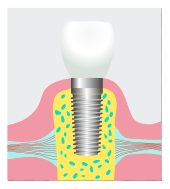Dental Implants
 During the last 20 years, dental implants have become a desirable alternative to other methods of replacing missing teeth. Excellent success rates and a range of available options give dentists a variety of new ways to treat and replace lost teeth.
During the last 20 years, dental implants have become a desirable alternative to other methods of replacing missing teeth. Excellent success rates and a range of available options give dentists a variety of new ways to treat and replace lost teeth.
Dental implants play an essential role in restorative dentistry. Because they are permanent prosthetic that are both natural-looking and cosmetically appealing, implants can be used either for cosmetic purposes or for complete full-mouth restorations.
Using Dental Implants in Restorative Dentistry
When a single tooth is lost, other teeth surrounding it may begin to shift, resulting in an unsightly appearance. In the past, bridges were the preferred method of cosmetic restoration, but surrounding teeth had to be damaged in order to support the prosthesis. As an alternative, many patients seek dental implants as a means of improving cosmetic appearance following the loss of a tooth. A dental implant has the look, feel and function of a natural tooth, and it’s positioning within the bone where the prior tooth was once rooted prevents other teeth from shifting out of place. The result is a visually appealing smile the wearer can be proud of.
In some cases, all of a patient’s teeth need to be replaced due to decay or other oral health complications. The teeth are vital to communication and digestion, so replacement is no longer a matter of cosmetic preference – but necessity. Options for full mouth restoration are limited to dentures or dental implants. More and more patients are choosing implants over dentures, as they provide a permanent solution that requires less maintenance and also preserves more of the natural maxillofacial bones surrounding the teeth.
Benefits of Dental Implants
When compared to fixed bridges and removable dentures supported by other teeth or gum tissue, implants offer numerous advantages:
1. Better esthetics:
Since implants are placed in the gum similar to the way a natural tooth is supported, they offer a more realistic and natural look compared to other alternatives.
2. Reduction of bone resorption:
When a tooth is lost, the supporting bone structure gradually recedes. Placing an implant in that empty space significantly reduces the speed of bone resorption and provides stability for this valuable tissue.
3. Retention:
Patients who have experienced removable full or partial dentures know that keeping their dentures in place is always a challenge. Dental implants offer a great improvement to denture retention for all patients. In some cases the denture can be secured to a group of implants with special screws that stabilize the denture completely.

4. Preserving natural tooth structure:
Often the preferred method of replacing a single missing tooth is a bridge. Bridges require extra preparation for the surrounding teeth to ultimately connect 3 or more teeth. This negatively impacts your health by making the task of retaining your teeth more difficult and by often requiring the destruction of existing tooth structure to create room for the new bridge. An implant is mostly an independent unit and does not negatively affect the adjacent teeth.
5. Improved Dental Hygiene:
Unlike bridges and dentures, which require special cleaning instructions and extra attention, dental implants just need regular brushing, flossing and dental hygiene appointments just like your natural teeth.
5. Improved Function:
Once dental implants are fully integrated into you jaw they function just as well as your own natural teeth and you can eat the foods you want and speak with complete confidence. With dentures, eating hard foods such as an apple can be a problem, either the dentures come loose or patients cannot withstand the hard biting forces as they cause pain in the gums. Irritation and inflammation of the gums is a common problem amongst denture patients. Dentures can be supported by implants which will improve function greatly enabling patients to eat the foods they want with complete confidence and not having to worry about bone loss and loose dentures falling out.
Looking for a great implant dentist in Hickory Creek? For more information please call our office to schedule your consultation.

